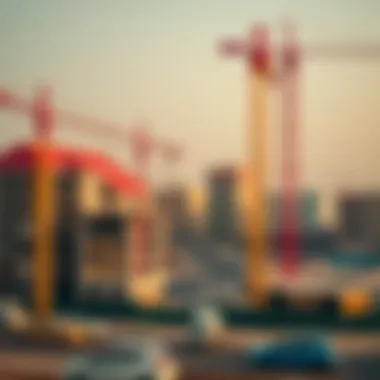UAE Real Estate Predictions for 2024: Trends & Insights


Intro
As we step into 2024, the real estate landscape in the UAE—particularly in Dubai—promises to be a kaleidoscope of opportunities and challenges for investors, homebuyers, and industry professionals alike. With a rapidly evolving market influenced by a myriad of economic and regulatory changes, it’s critical to keep a pulse on the trends that could shape decisions moving forward. This article synthesizes crucial insights and forecasts, guiding stakeholders through the labyrinth of property investments while equipping them with practical knowledge due for the coming year.
The real estate sector is often viewed as a barometer of a nation's economic health; in the UAE, that holds particularly true. With projects that proud themselves on a combination of luxury, innovation, and sustainability, understanding regional dynamics becomes indispensable.
Market Overview
Understanding the current state of the market not only provides a baseline for predictions but allows potential stakeholders to gauge upcoming trends.
Current Trends
The UAE's real estate market exhibited resilience as it rebounded from the impacts of the pandemic. The influx of expatriates looking for new residences played a notable role in driving demand. Moreover, with the support of government initiatives aimed at promoting foreign investments, there’s been a noticeable uptick in sales within the residential sector. Seasonal fluctuations characteristic of real estate have emerged, primarily due to tourism patterns and expatriate influxes.
Some noteworthy trends include:
- Sustainability: Green buildings are on the rise, with developments being pushed to meet stringent environmental standards.
- Technological Integration: Smart home features, alongside tech-driven services like blockchain for transaction transparency, are becoming more common.
- Mixed-Use Developments: These properties are attracting interest from both residential and commercial tenants, creating a vibrant community atmosphere and comprehensive living spaces.
"The current real estate landscape is witnessing a surreal transformation, blending modernity with forward-thinking designs."
Forecast and Predictions
Looking ahead, it is expected that the UAE will continue to adapt to global dynamics. The real estate market is forecasted to maintain its upward trajectory, supported by:
- Regulatory Reforms: Government policies aimed at boosting investments could play a pivotal role in creating a favorable environment. Investors and developers alike should keep an eye on policy shifts.
- Emerging Suburbs: Urban sprawl towards suburban areas may gain traction as families seek more space amid evolving lifestyle choices post-pandemic.
- Increased Foreign Investment: With initiatives to attract global investors, there is a likelihood of significant foreign influx, enhancing market liquidity.
Investment Opportunities
As the market outlook shifts, the possibilities for investment diversify significantly. Two key areas merit further exploration: residential properties and commercial ventures.
Residential Properties
The residential sector is expected to draw a crowd of investors, driven by the appeal of new developments and prime locations. Notable areas like Dubai Marina and Downtown Dubai remain hot spots, while up-and-coming neighborhoods such as Dubai Creek Harbour present enticing opportunities for early investments.
Investors should prioritize:
- Properties with High Rental Yields: Focusing on locales with solid rental returns can reduce risk.
- Luxury Apartments: The appetite for premium living spaces remains strong, indicating a steady demand.
Commercial Ventures
The commercial real estate sector is also anticipated to thrive, fueled by economic diversification and the need for innovative workspaces. There is a burgeoning demand for co-working spaces as businesses adapt to hybrid models.
Key aspects for prospective investors include:
- Smart Office Buildings: Facilities harnessing the latest technology attract businesses aiming to thrive in a digital age.
- Retail Spaces: As foot traffic steadily returns, strategic locations for retail could see considerable returns on investment.
Economic Forecast for the UAE in
The economic forecast for the UAE in 2024 presents a vital framework for investors and market participants to gauge the future landscape. Understanding the trends in GDP growth, inflation, and oil prices not only shapes investment decisions but also offers insights into the overall health of the real estate sector. With the unique position of the UAE as a global hub for trade and finance, these economic indicators will play a critical role in determining both risks and opportunities within the real estate market.
GDP Growth Predictions
Forecasts suggest that the UAE's GDP will experience a moderate growth rate in 2024. Analysts project a growth expectation ranging from 3% to 4%, driven largely by ongoing investments in infrastructure and diversification efforts away from oil dependence. More robust sectors such as technology, tourism, and renewable energy will contribute significantly to this growth.
It is crucial to keep an eye on key regions within the UAE, such as Dubai and Abu Dhabi. These emirates are likely to see uplift due to their strategic initiatives aimed at enhancing the business environment. For instance, the Expo 2020 legacy will continue to fuel real estate demand, especially in hospitality and commercial spaces. Investors should take into account local economic policies, as they steer the market dynamics.
Inflation Rates and Implications
Inflation has been a buzzword across the globe. Projections for the UAE indicate that inflation rates could hover around 2% to 3% in 2024. This may be influenced by various factors, including global supply chain disruptions and fluctuating prices of goods and services. A rise in inflation can affect purchasing power, leading to a potential squeeze on consumer spending. It is essential for investors to factor in this rate as it directly impacts real estate prices and rent levels.
With rising costs, landlords might fear a reduction in tenant demand as people look for more affordable housing options. Thus, understanding how inflation translates to actionable trends within the realm of real estate is pivotal. Investors might see variations across sectors, with luxury properties possibly bearing the brunt more than budget-friendly options.
Impact of Oil Prices on the Economy
The drop or rise in global oil prices carries significant weight for the UAE economy. Although there's a shift toward a more diversified economy, oil revenue remains a cornerstone of the country's financial health. Predictions for 2024 suggest that oil prices will stabilize, with analysts predicting prices between $70 to $90 per barrel.
A stable oil market tends to support government spending and infrastructure investment, fostering an environment conducive to real estate growth. For investors, this means that oil market dynamics can ripple through to housing demand and commercial developments. If oil prices rise significantly, more foreign investments might flow into the UAE, enhancing the overall market sentiment. In contrast, lower prices could tighten budgets, impacting public services and subsequently real estate activities.
"Oil prices and economic growth are intertwined. The UAE's ability to adapt to fluctuations will set the tone for real estate performance."


In summary, the economic forecast for the UAE in 2024 appears promising yet complex. Stakeholders must navigate the terrain marked by GDP growth, inflation, and oil prices to make informed decisions in the ever-evolving real estate market.
Real Estate Market Overview
The real estate market serves as a pivotal component of any economy, and the UAE’s landscape is no exception. Understanding the current state of this sector can reveal insights into wider economic trends, investment opportunities, and consumer behavior. In 2024, the real estate market in the UAE, particularly in established hubs like Dubai and Abu Dhabi, is expected to showcase a blend of resilience and transformation. This overview highlights the pressing dynamics that investors and homebuyers should contemplate.
Current State of the Market
Currently, the real state of the UAE real estate market is reflective of a notable rebound following the disruptions caused by global economic fluctuations. The pandemic, initially, created a significant lull, but now the market is thriving again, driven by both local and foreign investments. The implementation of various government initiatives aimed at economic diversification has promoted a renewed interest in residential and commercial properties.
Prices in prime locations like Dubai Marina and Downtown Dubai have seen a noticeable uptick, with some analysts projecting growth up to 10% in certain segments by year-end. Factors contributing to this uplift include a shortage of supply, resilient demand, and attractive mortgage rates, thus encouraging buyers to secure homes before prices rise further.
Emerging Trends in Property Demand
In 2024, several trends are surfacing in property demand that could reshape the real estate landscape. One of the most prominent trends is a shift toward sustainability. Many buyers today are seeking properties that emphasize eco-friendliness, integrated green spaces, and energy efficiency. Similarly, developers are responding to this demand by designing structures that meet high environmental standards, thereby boosting their appeal.
Another noticeable trend is the increased popularity of multi-functional spaces. With many companies adopting hybrid work models, potential buyers are favoring homes that can adapt to both living and working environments. These trends suggest a rethinking of space utilization, encouraging innovative designs to cater to a more dynamic lifestyle.
Shifts in Buyer Preferences
Understanding shifts in buyer preferences is crucial for anyone engaged in the UAE real estate market. Emerging data indicates that millennials and Gen Z are increasingly becoming major players in the property market, often driven by desire for urban living. Features like proximity to public transport, retail hubs, and lifestyle amenities are weighing heavily in their decision-making processes.
Moreover, there's a growing trend towards off-plan real estate investments, where buyers are betting on properties that are still in the pipeline. They often expect to secure more favorable pricing when these projects finally materialize. Homebuyers are also leaning towards properties built by reputable developers, indicating a need for quality assurance amidst the ever-shifting market landscape.
"In the fast-paced world of UAE real estate, staying attuned to the evolving buyer preferences and market trends is key to making informed investment decisions."
As 2024 unfolds, the UAE real estate market will undeniably be shaped by these trends and shifts, making it essential for investors, homebuyers, and industry professionals to remain observant and adaptable.
Investment Opportunities in
Navigating the real estate landscape in the UAE for 2024 offers a plethora of investment opportunities tailored to diverse investor profiles. As the region continues to attract capital, the various sectors within the real estate market display distinct characteristics that can serve both new and seasoned investors. Understanding these segments is crucial for making informed choices that align with one's investment objectives.
Residential Property Investments
Urban Developments
Urban developments in the UAE are shaping the fabric of its real estate market, particularly in metropolises like Dubai and Abu Dhabi. Striking features of these urban projects include modern architectural designs, integrated smart technologies, and access to essential amenities. Notably, developments such as Dubai Creek Harbour and the Dubai Marina District are garnering attention due to their focus on sustainability and community-oriented living.
The growth in urban areas is popular among investors due to its potential for higher rental yields and capital appreciation. The demand for housing in these bustling hubs is buoyed by the influx of expatriates and young professionals securing jobs in 2024. Even so, investors must weigh the risks of market saturation and competition, especially as new projects emerge regularly.
Suburban Trends
On the flip side, there is an equally compelling narrative surrounding suburban trends that merits consideration. The appeal of suburban areas rests upon their spacious living conditions, often coupled with lower costs compared to urban centers. Places like Jumeirah Village Circle and Dubai Hills are becoming increasingly popular, particularly among families seeking a more tranquil lifestyle.
The suburban surge points to a rising trend where buyers are prioritizing outdoor spaces and community facilities. As remote work becomes part of the new normal, many people are opting for homes outside city centers. This shift represents a significant opportunity for investors willing to tap into these emerging suburbs. However, the distance from urban infrastructure can be a downside for those reliant on urban conveniences.
Commercial Property Prospects
Office Space Demand
The demand for office space in the UAE, particularly in the wake of the global shift toward hybrid working models, is a key sector to monitor. Companies are reassessing their space needs, fostering a unique blend of traditional office setups and flexible, co-working spaces. Areas like Dubai’s Business Bay are witnessing a shift, with new designs that cater to both collaboration and individual productivity.
This commercial growth holds substantial promise for investors. Here, the key characteristic to note is the adaptability of space. Properties that can offer flexible leasing terms and versatile environments are likely to draw interest from both established firms and startups looking to make their mark.
Retail Sector Dynamics
The retail sector is also undergoing transformative changes. Traditional retail spaces are evolving as e-commerce gains traction, prompting landlords to rethink their strategies. The rise of mixed-use developments, where retail, residential, and leisure facilities coexist, reflects this shift. Locations such as Mall of the Emirates embody this trend, integrating leisure and shopping seamlessly.
Investors need to keep an eye on these developments. The unique feature here is the synergy between retail and experience. While the risk of declining foot traffic in traditional retail spaces exists, innovative approaches that provide immersive customer experiences can lead to profitable outcomes for those willing to adapt.
Luxury Real Estate Trends
The luxury segment of the UAE's real estate continues to thrive, especially with high-net-worth individuals drawn to the region's tax advantages and luxurious lifestyles. Iconic projects like the Bulgari Residences and The Palm Tower showcase how opulence meets architecture. Luxury real estate often acts as a stable investment due to its exclusivity and the high demand among affluent buyers.
Investors looking at this market must also consider the unique aspects of luxury developments, which often include bespoke services and world-class amenities. The challenge, however, remains in discerning true luxury offerings from those simply marketed as such.
As the year 2024 unfolds, the UAE's real estate market promises diverse investment opportunities. By staying informed about urban and suburban developments, evolving commercial needs, and the luxury segment, investors can navigate these promising waters with greater confidence.
Regulatory Changes and Impact
The section on regulatory changes is vital for understanding the real estate landscape in the UAE for 2024. Legal frameworks shape how property transactions are conducted and can either stimulate or stifle market activities. Investors and homebuyers must navigate these changes effectively to harness the full potential of their real estate endeavors. With evolving policies, there's an undeniable ripple effect across various sectors in the economy. Keeping abreast of these changes not only aids compliance but also offers strategic advantages in a heavily regulated environment.


Three pivotal areas of regulatory change that demand attention are property laws and residency regulations. Understanding these nuances will empower stakeholders to make informed decisions as they embark on their real estate journeys.
New Property Laws in the UAE
In 2024, the UAE's property market will witness key legislative changes aimed at increasing market transparency and protecting investor rights. The introduction of new property laws will likely streamline the process for buying, selling, and leasing real estate, making it less convoluted for everyone involved.
- Enhanced Transparency: Laws focusing on transparency will ensure that all parties have access to critical information pertaining to property transactions. This aspect is crucial, as it helps to combat fraud and fosters trust in the market.
- Investor Protections: New regulations are expected to bolster protections for both local and international investors. This includes clearer rights concerning property ownership, maintenance obligations, and dispute resolution mechanisms. Knowing these rights can safeguard investments and enhance market confidence.
- Regulatory Bodies: The establishment or strengthening of regulatory agencies responsible for overseeing compliance will play a pivotal role. With designated bodies, the enforcement of laws will become more consistent, offering peace of mind to potential investors.
With these developments, the property market in the UAE is geared towards becoming more investor-friendly, which is an encouraging sign for 2024.
Changes to Residency Regulations
Residency regulations are another cornerstone that influences the real estate market dynamics. Anticipated changes in 2024 may introduce more favorable conditions for foreign investors looking to establish residency through property purchases. These regulations are crucial for attracting international buyers seeking a permanent or long-term home in the UAE.
- Investor Visas: One significant amendment could be the introduction of investor visas linked to property investments. This initiative is aimed at reducing barriers for those willing to invest substantial amounts into real estate. The consequences of providing residency to high-net-worth individuals could invigorate the luxury real estate sector significantly.
- Family Inclusion: Changes might also include provisions allowing investors to sponsor their families for residency. This factor often persuades potential buyers, as having family in the UAE could act as a catalyst for real estate investment.
- Simplifying Processes: Eliminating unnecessary bureaucracy in residency applications can expedite the overall investment process. Potential investors will appreciate a seamless experience when navigating the legal intricacies of gaining residency through property ownership.
These shifts in residency regulations stand to enhance the UAE's position as a prime market for foreign investment, contributing to further growth in the real estate sector for the foreseeable future.
The adaptability of the UAE’s legal framework reacts to global economic conditions, amplifying its allure as a favorable destination for property investors.
Technological Innovations in Real Estate
In the dynamic landscape of the UAE's real estate sector, staying ahead means embracing change. Technological innovations are not just buzzwords; they are reshaping the way properties are managed, viewed, and transacted. As we venture into 2024, technologies such as artificial intelligence and virtual reality are stepping up as key players. The benefits are manifold—streamlined operations, enhanced customer experiences, and data-driven insights to make informed decisions. For investors, agents, and homebuyers, recognizing these trends is essential.
Use of Artificial Intelligence in Property Management
Artificial intelligence is becoming a game changer in property management. From predictive analysis to chatbots offering customer service, AI can optimize management processes like never before. Imagine a scenario where property managers can identify potential maintenance issues before they escalate, all thanks to smart algorithms that analyze data from various sources. This not only saves costs but also enhances tenant satisfaction by ensuring that issues are resolved promptly.
Moreover, AI can assist in streamlining tenant applications. Through automated systems, applicants can be vetted more efficiently, thereby reducing human error. This helps expedite lease agreements and creates a smoother onboarding process. By incorporating AI in these areas, property management companies can focus on more strategic decisions rather than getting bogged down by day-to-day operations.
"AI's role in property management will shape the efficiency and responsiveness of the industry, creating a win-win for both landlords and tenants."
Impact of Virtual Reality on Property Viewing
Virtual reality has come a long way from its nascent stages. In real estate, it offers a method to experience properties from the comfort of one’s home. This innovation is especially beneficial in a busy market like the UAE, where potential buyers may not have the time or opportunity to visit multiple properties in person. By using VR headsets, prospective buyers can take immersive tours, assessing every nook and cranny of a home before making a commitment.
This technology not only simplifies the process but also attracts a wider audience, including overseas investors who are keen to buy without traveling. However, while VR provides an engaging way to showcase properties, it's essential to manage expectations. Potential buyers viewing a home via virtual reality should be aware that the experience may not fully replicate the tactile reality of physical viewing.
On a broader scale, the integration of VR can reduce marketing costs and timeline. Real estate agents can create virtual open houses and client-specific guided tours without the need for physical space, making it easier to reach a global audience. As we progress further into 2024, the blend of technology with traditional real estate practices will become increasingly evident, ushering in a new era of property engagement.
Sustainability Trends
As we approach 2024, sustainability has taken root not just in public consciousness but also in the brick-and-mortar world of real estate in the UAE. Investors and developers are increasingly prioritizing eco-friendly practices. This shift isn’t merely a trend; it’s becoming a foundational aspect of building for the future. Properties that embrace sustainability are likely to attract more interest, enhance their value, and position themselves as leaders in an evolving market. By focusing on sustainability, the real estate sector can contribute to broader environmental goals while reaping economic benefits.
Green Building Practices
Green building practices are at the forefront of sustainable real estate development. These practices encompass design, construction, and operation techniques that minimize environmental impact while maximizing resource efficiency. For investors and homeowners alike, buildings adhering to these principles often promise lower energy costs and healthier living environments.
In the UAE, green building initiatives are driven by local regulations such as the Abu Dhabi’s Estidama program and Dubai’s Green Building Regulations. These regulations encourage developers to incorporate energy-efficient materials and technologies in their projects.
- Benefits of Green Building Practices:
- Reduction of energy and water consumption.
- Enhanced indoor air quality.
- Increased occupant satisfaction and productivity.
- Higher market demand due to growing eco-conscious consumer base.
Investors are beginning to recognize that properties with green credentials often command higher rents and resale values. As a result, sound investments are aligning with sustainable practices, making it a win-win for both the environment and the economy.
Renewable Energy Adoption in Real Estate
The transition towards renewable energy sources is becoming indispensable in the UAE's real estate landscape. With abundant sunlight, solar energy systems are gaining traction in residential and commercial properties. Integrating solar panels reduces reliance on grid electricity, leading to cost savings over time.
As the UAE aims to increase the contribution of clean energy sources to its total energy mix, real estate developers who adopt renewable energy sources stand to gain significantly.
- Key aspects of renewable energy adoption include:
- Installation of solar panels on residential rooftops, providing homeowners with the opportunity to generate their own electricity.
- Use of energy storage systems that balance energy consumption with production, ensuring reliability.
- Collaboration with local governments to encourage incentives for renewable energy utilization.
Moving forward, properties that adopt renewable energy solutions not only enhance their market appeal but also contribute positively to the region's sustainability goals and long-term viability.
*"Embracing sustainability is no longer an option; it’s a responsibility as the real estate sector navigates the complexities of tomorrow’s market."


This commitment to eco-friendly practices will be pivotal in shaping the future of the real estate market in the UAE as it heads into 2024.
Challenges Facing the Real Estate Sector
The real estate sector in the UAE, particularly in bustling hubs like Dubai and Abu Dhabi, faces several pressing challenges that must be examined closely. Understanding these challenges is essential not only for seasoned investors but also for new entrants in the market. By pinpointing these concerns, stakeholders can navigate potential pitfalls and adjust their strategies accordingly.
Market Saturation Concerns
One of the primary issues that the UAE real estate market might encounter in 2024 is the saturation of certain segments. As developments continue to pop up like daisies in spring, it raises flags about whether demand can keep pace with supply.
- Overview of Supply: Over the past few years, numerous towering skyscrapers and sprawling communities have emerged. However, not all these properties have found eager buyers or tenants.
- Diverse Properties: Listings range from ultra-luxury villas to affordable apartments. A mismatch between what’s available and what potential residents want could create an uphill battle for brokers.
- Consequences for Investors: For investors, a saturated market could lead to stagnation in property values, and in some dire cases, declines. Returns on investment may dwindle, prompting a reevaluation of their current portfolios or future ventures.
"Market saturation doesn't just affect prices; it also influences the entire ecosystem of real estate, from community engagement to infrastructural support."
Economic Uncertainty and Buyer Confidence
Economic uncertainty bears heavily on buyer confidence, which is pivotal in any market but particularly in real estate. In 2024, fluctuations in the global economy could shape potential buyers’ decisions, making them hesitant or overly cautious.
- Global Economic Factors: As the world grapples with inflation, geopolitical strains, and resource shortages, these factors may resonate through the UAE’s economy as well. Buyers may think twice before making significant investments if they feel uncertain about future economic stability.
- Local Economic Indicators: Local economic policies, the effectiveness of government initiatives, and how the job market reacts also come into play. Should these factors present ambiguous signs, a sluggish market reaction is forthcoming.
- Psychological Impact on Consumers: Buyer sentiment greatly influences the market. If potential homebuyers feel unsure about job security or worry about rising interest rates, they might delay purchases, waiting for a clearer picture.
Local and Global Market Comparisons
The landscape of real estate in the UAE cannot merely be considered in isolation; understanding local trends necessitates a comparative analysis with global markets. This section aims to shed light on how the UAE real estate sector stacks up against its contemporaries, particularly within the Gulf Cooperation Council (GCC) region and other major global hubs. Such comparisons are crucial for investors, as they provide insights into potential value increases, market saturation, and attractiveness for international buyers.
Comparison with Other GCC Markets
The GCC region, consisting of six countries—including Saudi Arabia, Qatar, and Kuwait—plays a significant role in shaping real estate trends. When one examines property dynamics across these markets, striking elements emerge that could influence the UAE's posterity.
For example, the Kingdom of Saudi Arabia has made waves with its Vision 2030 initiative, which aims to diversify its economy beyond oil dependency. Consequently, the surge in tourism infrastructure in Riyadh and Jeddah is attracting not just local buyers, but also international investors looking for emerging markets. In comparison, the UAE stands as a well-established market, showing resilience and adaptability.
- Strengths of the UAE:
- Considerations in Other GCC Markets:
- Stable Regulatory Framework: The UAE is known for its investor-friendly laws, which provide a safety net against abrupt market shifts.
- Long-standing Reputation: Cities like Dubai have become synonymous with luxury and innovation, making them appealing not just regionally but globally.
- Regulatory Challenges: Emerging markets in the GCC sometimes lack the comprehensive legal frameworks softening risks for investors.
- Market Maturity: Some GCC properties are still burgeoning, presenting both opportunities and uncertainties.
Such factors indicate the UAE might continue attracting a significant slice of investment if it can maintain its advantageous position relatively to its neighbors.
Dubai vs. Global Real Estate Hubs
Diving further on the comparison, it’s essential to position Dubai against key global real estate hubs—think London, New York, and Singapore. Each of these cities boasts unique characteristics tailored for investment, posing direct competition for the UAE's crown jewel.
- Accessibility and Connectivity: Dubai International Airport is one of the busiest in the world, serving as a prime transit point connecting East and West. This geographic advantage creates a unique proposition for businesses setting up in Dubai over those in Los Angeles, for example, which may carry higher operational costs due to geographical constraints.
- Market Stability: While cities like New York have seen a recent fluctuation in rental demand, Dubai’s property market has displayed a penchant for quicker recovery post-economic shocks. Even amidst global challenges, the flexibility of the UAE market continues to attract international buyers looking for less volatility.
- Cultural Attractions: Dubai's melange of cultures and high-profile events, such as Expo 2020, provides a vibrant backdrop that competes well with London’s historic allure or Hong Kong’s financial prowess—factors that are attractive not only for investors but also for potential residents.
"In an ever-evolving global real estate landscape, Dubai continues to innovate and adapt, positioning itself strategically as a preferred investment destination."
These elements lay the groundwork for a robust comparison, showing how the UAE's regulatory strengths and unique lifestyle offerings place it favorably on the global stage. This comparative analysis aids investors in aligning their strategies with current market trends, maximizing opportunities while concurrently mitigating risks.
Future Predictions Beyond
In the bustling landscape of the UAE’s real estate market, looking beyond 2024 becomes essential for investors, homebuyers, and industry players. The dynamics in this sector will not only reflect on immediate profitability and growth but also impact long-term strategies and market stability. Recognizing emerging trends, evolving demographics, and economic shifts leads to a more informed decision-making process for all stakeholders involved. This clarity allows them to navigate potential risks and harness promising opportunities that may arise in the years ahead.
Long-Term Market Transformations
The real estate market is a living organism, constantly adapting to various external pressures and internal demands. As we peep into the future, we observe several significant transformations anticipated to unfold in the UAE real estate realm.
Firstly, urbanization will continue to drive demand, especially in cities like Dubai and Abu Dhabi. The influx of expatriates seeking better opportunities will push the boundaries of urban development. Infrastructure development will become increasingly sophisticated, bolstering public transport and enhancing accessibility. This presents a golden opportunity for investors to tap into emerging neighborhoods that could become the next hot spots.
Moreover, as sustainability remains at the forefront of global discussions, the UAE is expected to lead by example in green building initiatives. Adopting energy-efficient technologies and sustainable practices will no longer be a luxury but a requisite for properties aiming to attract conscious consumers. Investors should keep a keen eye on projects that prioritize eco-friendliness, as they will likely command higher value over time.
Lastly, the integration of smart technologies in property management will revolutionize how real estate is developed and sold. Properties equipped with automation features will become more appealing to tech-savvy buyers. A house or apartment that can adapt to the needs of its inhabitants can become a highly sought-after asset.
"The future belongs to those who believe in the beauty of their dreams." - Eleanor Roosevelt
Considering these major transformations, investors need to prepare themselves for a market fueled by adaptability and innovation.
Evolving Buyer Demographics
As we venture further into the realm of real estate, understanding the evolving buyer demographics is crucial for making astute investments. Shifts in generational preferences reference a growing trend that actualizes both challenges and opportunities.
Today's buyers are not just focusing on property size and location. There's a noticeable shift towards lifestyle-oriented choices. For instance, millennials and Gen Zers prioritize community engagement, proximity to cultural landmarks, and sustainability. This demographic is likely to favor mixed-use developments that blend residential spaces with recreational opportunities. The development of community-centric neighborhoods should be on the radar for smart investors.
Furthermore, the rise of remote working trends also shapes buyer intentions. Individuals are seeking properties that provide conducive workspaces while maintaining a decent quality of life. Buyers will weigh their options more closely, factoring in workflow capabilities alongside leisure amenities.
Investors should also acknowledge the growing influence of international markets on the UAE’s real estate landscape. The influx of overseas buyers from various regions creates a diverse market with specific demands and preferences. Adapting properties to suit different cultural expectations can provide a competitive edge amidst a sea of increasing choices.
To summarize, real estate professionals must remain sensitive to the shifting buyer psyche and modify their marketing strategies accordingly. Foresight into evolving demographics can spell the difference between a seasonal investment and a legacy asset.







